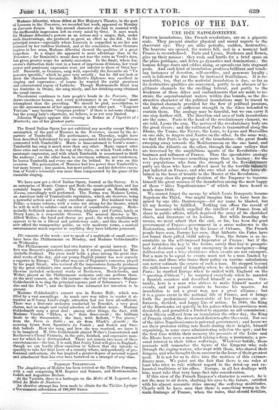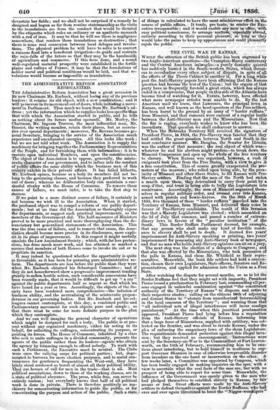TOPICS OF THE DAY.
TINE IDEE NAPOLEONIENNE.
FRENCH inundations, like French revolutions, are on a gigantic scale. They present similar physical and moral aspects to the observant eye. They are alike periodic, sudden, destructive. The heavens are opened, the waters fall, and in a moment half France is overwhelmed. Paris and Lyons, Bordeaux and Rouen, give up their masses ; they rush and hurtle for a brief space on the place publique, and down go dynasties and dominations ; the human deluge roars and eddies along, or spreads out into stagnant pools. And each kind of inundation produces brilliant and touch- mg instances of devotion, self-sacrifice, and generous loyalty ; each is followed in due time by increased fruitfulness: It is re- markable, too, that as the material inundation is due so far as its destructive qualities are concerned, partly to an absence of le- gitimate channels for the swelling torrent, and partly to the weakness of those dikes and embankments that are made to re- strain the superabundant waters within due bounds, so the de- structive character of the political inundations may be traoed to the limited channels provided for the flow of political passions, and the absence of sufficient strength in the dikes intended to contain them. The analogy may be fanciful, but we can carry it one step farther still. The direction and area of both inundations are the same. Paris is the head of the revolutionary element, we are told, Lyons the arm. The nerves of the revolutionary body are the great rivers ; and the volition of Paris is transmitted along the Rhone, the Yonne, the Nievre, the Loire, to Lyons and Marseilles on one side, to Angers and Nantes on the other. In the same way, we find that Paris is the apex of the inundation—the great floods sweeping away towards the Mediterranean on the one hand, and towards the Atlantic on the other, through the same valleys that are traversed by the amphibious agents of the Revolution—the boatmen and raftsmen of France. Thus the speculative •analogy we have drawn becomes something more than a fantasy ; for the very populations who form the strength of the Revolutionary party are those who have suffered most by the terrible'salamity just inflicted on France, and who owe what solace they have ob- tained. in the hour of trouble to the Master of •the Revolution.
We may class the prompt decision of the Emperor to traverse himself the great courses of the inundation among the most happy of those " idees Napoleoniennes " of which we have heard so much since 1848, We cannot forget the means by which Louis Bonaparte because i
Napoleon the Third. One might imagine him to have been in- spired by sine ides Dantonesque—let my nazhe be blasted, but let my destiny be fulfilled. Nothing can efface the record of those measures which expelled the intellect of France from -all share in public affairs, which deprived the army of its cherished. chiefs, and literature of its leaders. But while branding the means, we must admit that the end, so far, has been the good. government of France--government in a sense unknown to the Restoration, unbelieved in by the house of Orleans. The French people have seen, Europe has seen, that hitherto the Fates have not found their gifted child asleep. True the future is as in- scrutable as the self-imposed Imperator of France ; ',but if the past furnishes the key to the future, surely that key is prompti- tude of decision equal to any emergency in an emergency—long deliberation and a wise abstinence when events are not emergent.. But a man to be equal to events must not be a man limited by routine, and those who frame their policy on routine calculations can never estimate the course of such a man. He stepped beyond the mill-horse round of kingship when he determined to rebuild Paris ; he startled Europe when he united with England on the " question d'Orient " ; he surprised everybody when he married a Spanish countess and described himself as a parvenu. Cer- tainly, here is a man who strives to make himself master of events, and not permit events to become his master. An inundation is not a great war, nor a great alliance ; but it is a grave event in the national life of France, and it brings forth the predominent characteristic of her Emperor—an un- foreseen, decided, and happy line of action. In 1840, the King of the Barricades sat quietly in his palace when his provinces were desolated, and permitted a Prefect to organize an aid commission ; when Silesia suffered from an inundation the other day, the King of Prussia visited the devastated districts after the event. But one of the idees Napoleoniennes is paternal government; and hence we see their professor riding into floods during their height, himself organizing, in some cases administering relief on the spot ; and for the first time within their memory the peasants of the 'Loire and the Rhone have seen a monarch taking a deep, a passionate, a per- sonal interest in their bitter sufferings. Whatever 'betide, those peasants will remember the figure of the Emperor who rode through the raging waters, who wept with them, who shared their dangers, and who brought them succour in the hour of their greatest need. It is not for us to dive into the motives of this extraor- dinary man. We point out the fact that there is one ruler at least who tries to rule without regard to the dried-up and ex- hausted traditions of his office. Europe, in all her dealings with him, must take that very large fact into consideration. U this view of the French Emperor's character is correct, he is not the man to sit down, shutting his eyes to the future, satisfied with his almost romantic rides among the suffering multitudes. Clearly will he have seen that there is something wrong in the main drainage of France, when the rains, that should fertilize, devastate her fields; and we shall not be surprised if a remedy be designed and begun as far from routine statesmanship as the visits -to the inundations are from the conduct that would be dictated by the etiquette which rules an ordinary or an apathetic monarch with tired of iron. It may be that he will see there is negligence somewhere, that renders these inundations so destructive ; that -there is some real connexion between local deluges and revolu- tions. The physical problem he will have to solve is to convert a ruinous flood into a beneficent irrigation—to guide and restrain the rain-falls of the future so that they may be the handmaids of agriculture and commerce. If this were done, and a sound well-regulated material prosperity were established in the fertile plains and valleys of France, it may be that the foundations of nobler moral and political conditions would be laid, and that re- ;volutions would become as impossible as inundations.



























 Previous page
Previous page